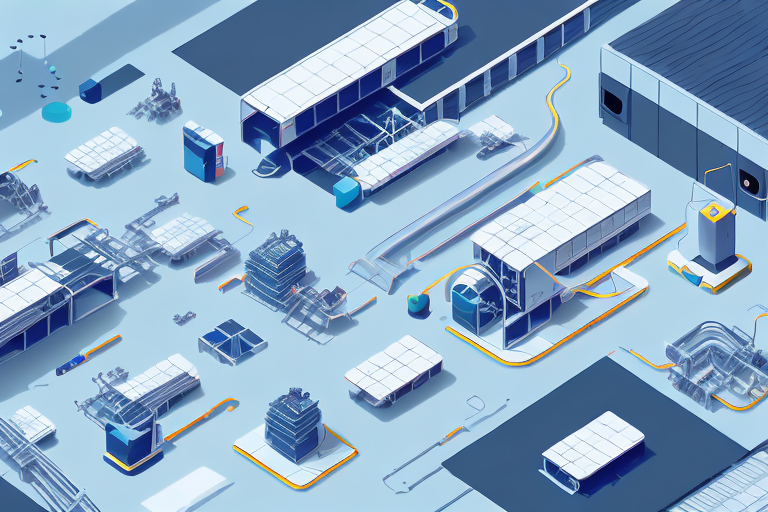Technological Advancements in the Logistics Industry
The logistics industry is leveraging cutting-edge technologies to enhance efficiency, accuracy, and scalability. These advancements are reshaping supply chain operations and setting new standards for performance.
Automation and Robotics
Automation remains a cornerstone of modern logistics. The integration of autonomous robots and drones has significantly improved the speed and accuracy of product handling, sorting, and delivery. According to a McKinsey report, automated systems can reduce operational costs by up to 30% while increasing productivity.
Artificial Intelligence and Machine Learning
Artificial Intelligence (AI) and Machine Learning (ML) are pivotal in optimizing logistics operations. These technologies analyze vast datasets to forecast demand, optimize routing, and predict maintenance needs. For instance, AI-driven route optimization can lead to a 20% increase in delivery efficiency, as reported by Gartner.
Big Data and Analytics
Big Data analytics provide actionable insights into supply chain operations. By leveraging real-time data, companies can enhance inventory management, improve forecasting accuracy, and streamline capacity planning. A study by SAS highlights that businesses utilizing big data analytics see a 15% improvement in their inventory turnover rates.
Blockchain Technology
Blockchain offers unparalleled transparency and security in supply chain management. By maintaining immutable records, blockchain reduces fraud and enhances trust among stakeholders. According to IBM, blockchain integration can decrease paperwork by up to 75% and improve compliance tracking.
Autonomous Vehicles
Autonomous vehicles are revolutionizing the transportation sector within logistics. These vehicles operate continuously without human intervention, significantly reducing delivery times and operational costs. A Forbes article projects that autonomous vehicles could cut transportation costs by 40% by 2030.
The Impact of E-commerce on Logistics
The explosive growth of e-commerce has fundamentally transformed logistics, driving the need for more efficient and responsive supply chain solutions.
Growth of E-commerce
E-commerce sales are projected to reach $6.54 trillion by 2023, up from $3.53 trillion in 2019, according to eMarketer. This surge has heightened demand for faster and more reliable delivery services.
Last-Mile Delivery Solutions
Last-mile delivery, the final step in the delivery process, has gained significant attention due to increased consumer expectations for swift deliveries. Innovations such as crowd-sourced delivery platforms and electric delivery vehicles are addressing challenges related to cost and sustainability.
Same-Day and Next-Day Delivery
Consumers are increasingly opting for same-day and next-day delivery options. Logistics companies are investing in localized warehousing and advanced routing technologies to meet these demands, enhancing customer satisfaction and loyalty.
Handling Returns and Reverse Logistics
The rise in online shopping has led to a corresponding increase in product returns. Efficient reverse logistics systems are essential to manage returns seamlessly, reducing costs and minimizing environmental impact.
Sustainability in the Logistics Industry
Sustainability has become a critical focus for logistics companies aiming to reduce their environmental footprint and comply with regulatory standards.
Adoption of Green Technologies
Logistics firms are investing in electric and hybrid vehicles to lower carbon emissions. Additionally, the use of renewable energy sources in warehouses and distribution centers is becoming more prevalent.
Optimizing Packaging and Reducing Waste
Optimizing packaging materials and processes helps reduce waste and lower transportation costs. Companies are adopting biodegradable and recyclable packaging solutions to promote environmental responsibility.
Route and Load Optimization
Advanced software tools are enabling logistics providers to optimize delivery routes and load capacities, resulting in reduced fuel consumption and lower greenhouse gas emissions.
Risk Management and Security in Logistics
Effective risk management and robust security measures are vital for maintaining the integrity and reliability of supply chains.
Comprehensive Risk Management Frameworks
Implementing robust risk management frameworks helps logistics companies identify and mitigate potential threats, ranging from natural disasters to cyber-attacks.
Enhancing Cybersecurity
With the increasing reliance on digital technologies, logistics firms must prioritize cybersecurity to protect sensitive data and prevent breaches. Implementing encryption, access controls, and regular security audits are essential steps.
Protecting Against Physical Threats
Physical security measures, including surveillance systems and secure storage facilities, are crucial to prevent cargo theft and ensure the safe transport of goods.
Workforce Challenges and Solutions in Logistics
The logistics industry faces significant workforce challenges, including shortages and the need for skilled labor. Addressing these issues is essential for maintaining operational efficiency.
Addressing Workforce Shortages
The industry is experiencing a shortage of qualified workers due to factors such as an aging workforce and limited entry of new talent. Companies are implementing recruitment initiatives and offering competitive benefits to attract skilled professionals.
Training and Development Programs
Investing in training and development helps bridge the skills gap. Programs focused on technology adoption, safety protocols, and operational efficiency enhance workforce capabilities.
Leveraging Technology for Workforce Efficiency
Automation and advanced software solutions can alleviate the burden on human workers by streamlining repetitive tasks, allowing employees to focus on more strategic activities.
Conclusion
The logistics industry is undergoing a transformative period driven by technological advancements, the growth of e-commerce, and a heightened focus on sustainability and security. Companies that embrace these changes, invest in innovative solutions, and prioritize workforce development will be well-positioned to thrive in the evolving landscape. Staying ahead of these trends is crucial for maintaining competitiveness and achieving long-term success in the dynamic world of logistics.




















